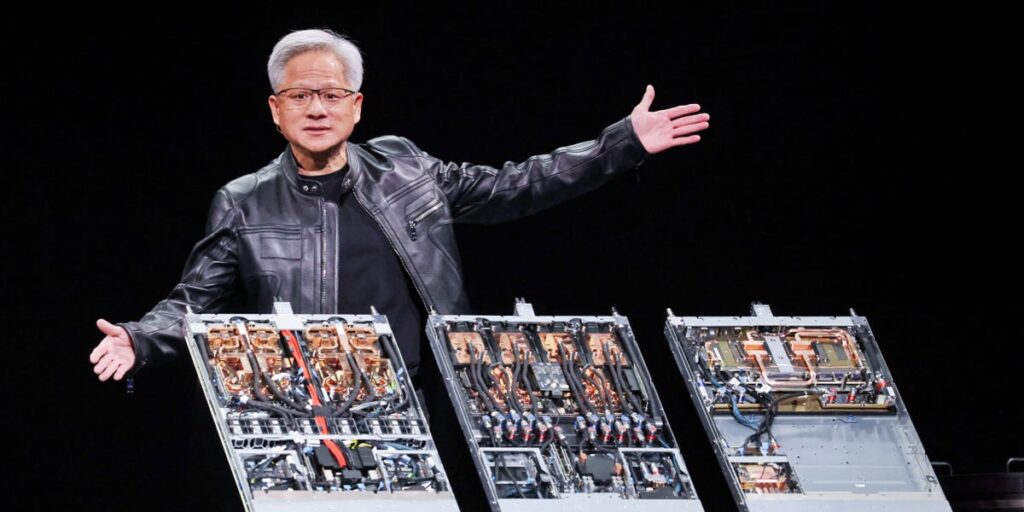Taiwan’s biggest tech celebrity — clad in his signature black leather jacket — ran onstage in Taipei on Monday morning with a lot to talk about.
Jensen Huang’s 100-minute keynote at the tech show Computex featured Nvidia’s usual assortment of high-tech videos, complete with a cute robot, and praise for semiconductor hub Taiwan.
The tech titan also outlined new products and a significant regional expansion. Business Insider was in the audience while Huang spoke — here are the top four takeaways from his speech.
1. Nvidia’s new office
Speculation about Nvidia’s new office in Taiwan has been brewing since Huang said in January that the company’s current building was too small and that it was “looking for real estate.”
On Monday, Taipei’s mayor, Chiang Wan-an, generated buzz when he showed up at Huang’s keynote. Huang went on to announce that Nvidia is eying the Beitou Shilin area — home to a science park — in northern Taipei for the tech giant’s new Taiwan office, named “Nvidia Constellation.”
The announcement was met with applause and cheers from the audience.
Chiang said in a media interview following Huang’s keynote that the city government welcomes Nvidia’s move and will provide any necessary assistance.
2. New computer systems
Huang introduced Nvidia’s DGX systems, which are designed for users who want heavy-duty AI without dedicating significant storage space to a weighty server system.
The physical workstation can be used as a single computer or as a central node for multiple users.
“This computer is the most performance you can possibly get out of a wall socket. You could put this in your kitchen. But just barely, if you put this in your kitchen and then somebody runs the microwave, I think that’s the limit,” he joked.
Huang said the cloud-based system — DGX Spark — will be ready in a few weeks. Nvidia is working with companies including Dell and HP on the systems.
“I’ll let all of our partners price it for themselves, but one thing’s for sure: Everybody can have one for Christmas,” Huang said.
3. DeepSeek praise
Huang talked software, too.
He praised the DeepSeek R1 model, saying that it’s “genuinely a gift to the world’s AI industry.”
“The amount of computer science breakthroughs is really quite significant and has really opened up a lot of great research for researchers in the United States and around the world,” Huang said.
He said DeepSeek R1 — owned by the Chinese hedge fund High-Flyer — has made a “real impact” in how people think about AI and that it has made a “great contribution to the industry and the world.”
Shares of Nvidia and many of its peers were clobbered in January, as Wall Street grappled with how to price in the new, seemingly cheaper technology.
Huang said in February that investors got it wrong because the industry will still need computing power for post-training.
4. New AI supercomputer for Taiwan
Huang announced an Nvidia collaboration with Taiwan Semiconductor Manufacturing Company, Foxconn — the world’s largest electronics contract manufacturer — and the Taiwanese government to build an AI supercomputer for the island.
Nvidia’s joint effort with the Taiwanese government and Taiwan’s top tech giants highlights the Santa Clara-based company’s close ties to the hub of global chipmaking.
Born in Tainan in southern Taiwan before he moved to the US as a child, Huang’s meteoric rise to the top of tech royalty has captivated Taiwan and catapulted him to folk hero status.
In Taiwan, Huang is surrounded by local media and fans who ask for selfies and autographs. The celebrity factor has also rubbed off on Nvidia, the company he cofounded, at home and abroad. The chipmaker’s stock is up nearly 43% in the last year.


